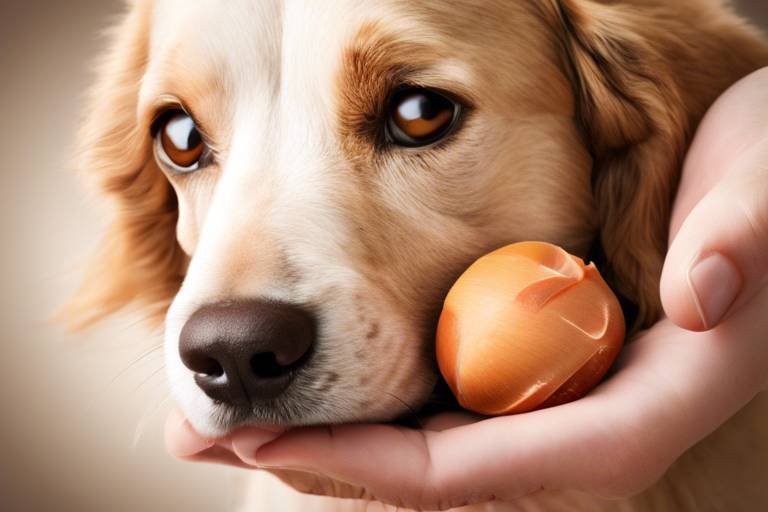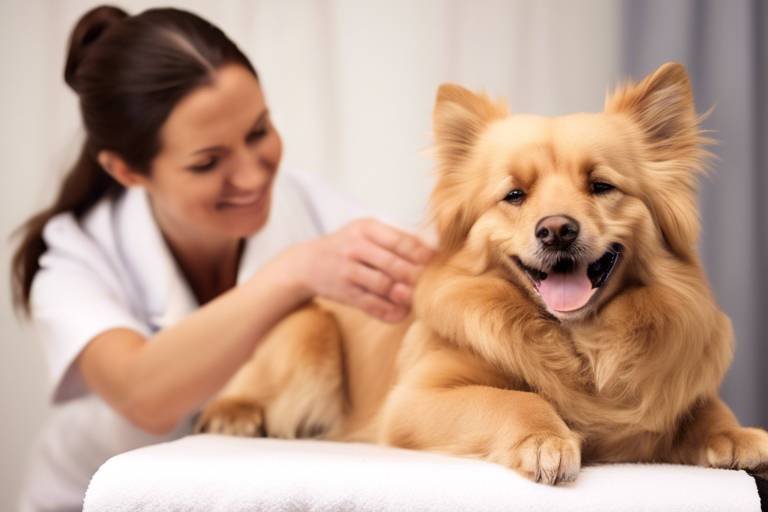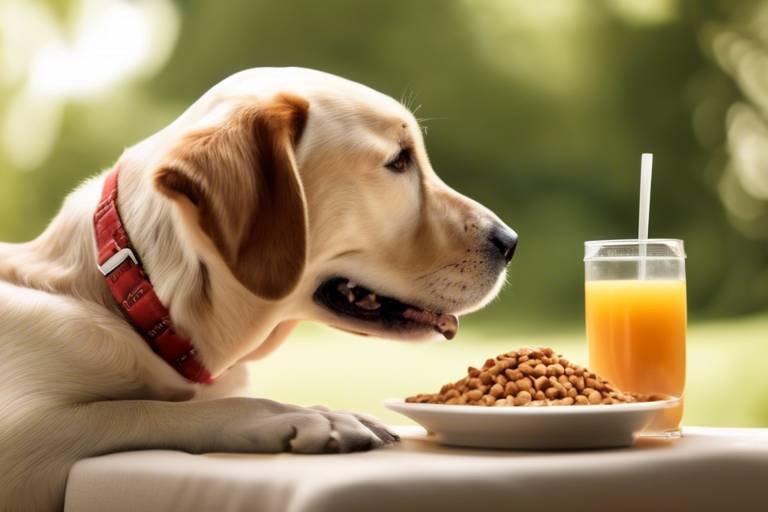Understanding Pet Digestive Health - Common Issues
As pet owners, we often focus on the visible aspects of our furry friends' health—like their shiny coats or playful demeanor. However, digestive health is just as crucial, yet it often goes unnoticed until something goes wrong. Just like us, pets can experience a variety of digestive issues that can affect their overall well-being. Understanding these common problems can save you from unnecessary worry and ensure your pet remains happy and healthy.
In this article, we will explore the various aspects of pet digestive health, highlighting common issues, symptoms, and prevention strategies. By being informed, you can recognize the signs of trouble early on and take action to protect your beloved companion. After all, a healthy gut means a happy pet!
When it comes to our pets, the digestive system is a complex network that plays a vital role in their health. Some of the most prevalent digestive problems include diarrhea, constipation, and vomiting. Each of these conditions can signal underlying health issues and should never be ignored. For instance, while a single bout of vomiting might just be a reaction to something they ate, persistent vomiting could indicate a more serious problem that requires veterinary attention.
Recognizing the symptoms of these digestive issues is essential for timely intervention. For example, if your pet is experiencing diarrhea, it’s not just an inconvenience; it can lead to dehydration, which can be dangerous. Similarly, constipation can cause discomfort and lead to more severe complications if not addressed. By paying attention to your pet’s behavior and stool quality, you can catch potential issues before they escalate.
So, how do you know if your pet is experiencing digestive distress? Some common signs include:
- Lethargy: If your usually energetic pet is suddenly sluggish, it might be a sign of discomfort.
- Loss of Appetite: A sudden disinterest in food can indicate digestive issues.
- Abnormal Stool: Changes in stool consistency, color, or frequency can be a red flag.
Being vigilant about these signs can help you act quickly, ensuring your pet gets the care they need. Remember, just like us, pets can't tell us when something's wrong, so it's up to us to observe and respond accordingly!
Diarrhea is one of the most common digestive issues faced by pets, and it can be quite alarming for pet owners. Not only can diarrhea be messy, but it can also lead to dehydration if not managed properly. Understanding the potential causes of diarrhea is key to addressing the problem effectively.
There are numerous reasons why your pet might experience diarrhea. Some of the most common causes include:
- Dietary Changes: Sudden changes in diet can upset your pet's stomach.
- Infections: Bacterial or viral infections can lead to gastrointestinal upset.
- Parasites: Intestinal parasites can wreak havoc on your pet's digestive system.
Identifying the cause is crucial for effective treatment, so keep an eye on any recent changes in your pet's diet or environment.
Treatment for diarrhea often starts with dietary adjustments. A bland diet, such as boiled chicken and rice, can help settle your pet's stomach. In some cases, medications may be necessary to address underlying infections or parasites. However, it’s important to consult your veterinarian if diarrhea persists for more than 24 hours, as they can provide tailored advice and treatment options to restore your pet's digestive health.
On the other end of the spectrum, constipation is another digestive issue that can cause significant discomfort for pets. If your pet is straining to defecate or producing hard, dry stools, they may be suffering from constipation. This condition can lead to serious complications if not addressed promptly.
Preventing digestive issues in pets is essential for maintaining their overall health and happiness. Here are some practical tips to promote optimal digestive health:
- Balanced Diet: Ensure your pet is eating a high-quality diet that meets their nutritional needs.
- Regular Exercise: Physical activity can help stimulate digestion and prevent constipation.
- Routine Vet Check-ups: Regular visits to the veterinarian can help catch potential issues early.
A proper diet plays a crucial role in digestive health. High-quality pet food that is rich in fiber can help prevent digestive problems. Fiber aids in digestion and promotes regular bowel movements, making it an essential component of your pet's diet.
Lastly, routine veterinary visits are essential for early detection of digestive issues. Regular check-ups and vaccinations not only keep your pet healthy but also provide an opportunity for your vet to discuss any dietary changes or concerns you might have. Remember, an ounce of prevention is worth a pound of cure!
Q: What should I do if my pet has diarrhea?
A: Monitor your pet's condition. If diarrhea persists for more than 24 hours, consult your veterinarian for advice.
Q: How can I prevent constipation in my pet?
A: Ensure your pet has a balanced diet with adequate fiber and encourage regular exercise.
Q: When should I take my pet to the vet for digestive issues?
A: If your pet shows signs of distress, such as vomiting, lethargy, or abnormal stool, it's best to consult your veterinarian.

Common Digestive Issues in Pets
This article explores various aspects of pet digestive health, highlighting common issues, symptoms, and prevention strategies to ensure your furry friends maintain a healthy digestive system.
When it comes to our beloved pets, their health is always a top priority. One of the most crucial aspects of their well-being is their digestive health. Just like humans, pets can experience a range of digestive issues that can affect their overall quality of life. From the occasional upset stomach to more serious conditions, understanding these common digestive problems is essential for every pet owner.
Some of the most prevalent digestive issues in pets include diarrhea, constipation, and vomiting. Each of these conditions can manifest in various ways and can be caused by different factors. For instance, diarrhea may occur due to dietary changes, infections, or even stress, while constipation can result from a lack of fiber in their diet or dehydration. Recognizing these symptoms early on can make a significant difference in how quickly your pet receives the care they need.
Here’s a closer look at some common digestive issues:
- Diarrhea: Often characterized by loose or watery stools, diarrhea can lead to dehydration if not addressed promptly.
- Constipation: This occurs when a pet has difficulty passing stools, leading to discomfort and potential health risks.
- Vomiting: While occasional vomiting may not be alarming, frequent occurrences can indicate underlying health issues.
Understanding these issues not only helps in identifying symptoms but also in taking preventive measures. For instance, a sudden change in diet can upset a pet's stomach, so it's essential to transition their food gradually. Additionally, regular exercise can aid in promoting a healthy digestive system. By being aware of these common issues, pet owners can ensure that their furry companions remain happy and healthy.
In summary, keeping an eye on your pet's digestive health is vital. If you notice any signs of distress or abnormal behavior, don't hesitate to consult your veterinarian. After all, a healthy pet is a happy pet!
Here are some common questions pet owners have regarding digestive health:
- What should I do if my pet has diarrhea? - Monitor their hydration and consider dietary adjustments. If diarrhea persists, consult your vet.
- How can I prevent constipation in my pet? - Ensure they have a balanced diet rich in fiber and encourage regular exercise.
- When should I be concerned about my pet's vomiting? - If vomiting occurs more than once or is accompanied by other symptoms, seek veterinary advice.

Signs of Digestive Distress
As a pet owner, being able to recognize the signs of digestive distress is crucial for ensuring your furry friend stays healthy and happy. Just like us, pets can experience a range of digestive issues that can lead to serious health problems if left untreated. So, how do you know when something's off? Here are some key indicators that your pet might be facing digestive troubles.
One of the most common signs of digestive distress is lethargy. If your usually playful pup or curious kitty seems less energetic than normal, it could be a sign that something isn't right in their belly. Think of it like a warning light on your car dashboard; it’s telling you to pay attention before things get worse.
Another red flag to watch for is a loss of appetite. If your pet suddenly turns their nose up at their favorite food, it’s worth investigating further. Just like we might skip a meal when feeling unwell, pets often do the same. A sudden change in eating habits can indicate underlying digestive issues that require attention.
Additionally, keep an eye on your pet's stool. Abnormal stool can be a clear indicator of digestive distress. Healthy stool should be firm and well-formed. If you notice changes such as diarrhea, constipation, or even blood in the stool, it's time to consult your veterinarian. Remember, your pet’s poop can tell you a lot about their health!
Other signs to look out for include:
- Vomiting: Frequent vomiting can lead to dehydration and should not be ignored.
- Flatulence: Excessive gas can be uncomfortable and might indicate dietary issues.
- Abdominal Pain: If your pet is whining or showing signs of discomfort when you touch their belly, it could be a sign of digestive distress.
In conclusion, being attentive to these signs can make a significant difference in your pet's well-being. If you notice any of these symptoms, don’t hesitate to reach out to your veterinarian. After all, a healthy pet is a happy pet!
| Question | Answer |
|---|---|
| What should I do if my pet has diarrhea? | Monitor their hydration levels, adjust their diet, and consult your veterinarian if it persists for more than 24 hours. |
| How can I tell if my pet is in pain? | Signs may include whining, changes in behavior, sensitivity to touch, or reluctance to move. |
| Is it normal for pets to vomit occasionally? | Occasional vomiting can happen, but frequent vomiting is a cause for concern and should be checked by a vet. |
| What dietary changes can help my pet's digestive health? | Introduce high-quality pet food and ensure a good balance of fiber in their diet. |
Diarrhea in Pets
Diarrhea in pets is more than just a messy inconvenience; it can be a serious health concern that requires immediate attention. When your furry friend experiences diarrhea, it’s crucial to recognize that this condition can lead to dehydration, which is particularly dangerous for pets. Imagine your pet as a delicate flower; without the right amount of water and nutrients, it can wilt and suffer. Just like humans, pets can experience digestive upset for various reasons, and understanding these can help you act swiftly.
So, what causes diarrhea in our beloved pets? There are numerous factors at play, and while some may seem trivial, others can indicate a more severe underlying issue. Common causes include:
- Dietary Changes: Sudden shifts in your pet's diet can upset their stomach, leading to diarrhea.
- Infections: Bacterial, viral, or parasitic infections can wreak havoc on your pet’s digestive system.
- Food Intolerances: Some pets may have sensitivities to certain ingredients, causing gastrointestinal distress.
- Stress: Just like us, pets can experience stress, which can manifest as digestive problems.
Recognizing the symptoms of diarrhea is essential for timely intervention. If you notice your pet having loose stools more than twice in a day, it’s time to take action. Other signs to watch for include lethargy, loss of appetite, and vomiting. These symptoms can indicate that your pet is not only uncomfortable but also at risk for dehydration. Think of it this way: if your pet were a car, you wouldn’t ignore the warning lights on the dashboard, would you? The same goes for their health.
When it comes to treatment options for diarrhea, the approach may vary depending on the severity and underlying cause. In mild cases, dietary adjustments can be incredibly effective. Switching to a bland diet, such as boiled chicken and rice, can help soothe your pet's stomach. However, if diarrhea persists for more than 24 hours, or if your pet shows signs of severe distress, it’s crucial to consult a veterinarian. They may recommend medications or further diagnostic tests to pinpoint the issue.
In conclusion, while diarrhea can be a common issue in pets, it should never be taken lightly. As a responsible pet owner, being vigilant and proactive can make all the difference in ensuring your furry friend stays healthy and happy. Remember, your pet relies on you to interpret their needs, so stay informed and ready to act!
1. How can I tell if my pet is dehydrated due to diarrhea?
Signs of dehydration include dry gums, excessive thirst, and lethargy. If you suspect dehydration, contact your veterinarian immediately.
2. Can I treat my pet’s diarrhea at home?
In mild cases, dietary changes can help, but it’s always best to consult with your veterinarian for persistent or severe diarrhea.
3. When should I take my pet to the vet for diarrhea?
If diarrhea lasts more than 24 hours, is accompanied by vomiting, or if your pet shows signs of distress, seek veterinary care.
Causes of Diarrhea
Diarrhea in pets is often a sign that something is amiss in their digestive system. Understanding the causes of diarrhea is essential for pet owners, as it can help in identifying the underlying issues and seeking timely veterinary care. There are several reasons why your furry friend might experience this uncomfortable condition.
One of the most common culprits is dietary changes. Pets can be quite sensitive to sudden shifts in their diet. For instance, if you've recently switched to a new brand of food or introduced table scraps, your pet's stomach may react negatively. This can lead to gastrointestinal upset, resulting in diarrhea. Additionally, some pets may have allergies or intolerances to specific ingredients, which can also trigger digestive distress.
Another significant cause of diarrhea is infections. Just like humans, pets can contract infections from various pathogens, including bacteria, viruses, and parasites. For example, parasites such as Giardia and roundworms are notorious for causing diarrhea in dogs and cats. These infections can lead to severe gastrointestinal issues, and it's vital to consult your veterinarian for appropriate testing and treatment.
In some cases, diarrhea can be a result of stress. Pets are sensitive creatures, and changes in their environment—like moving to a new home, the arrival of a new family member, or even a visit to the vet—can cause anxiety. This emotional turmoil can manifest physically, leading to digestive problems. It's crucial to monitor your pet's behavior and emotional health, as stress management can play a key role in maintaining their digestive health.
Lastly, certain underlying health conditions can contribute to chronic diarrhea. Issues such as liver disease, pancreatitis, or inflammatory bowel disease can disrupt normal digestion and lead to persistent diarrhea. If your pet experiences frequent bouts of diarrhea, it's essential to consult your veterinarian for a thorough examination and potential diagnostic tests.
In summary, the causes of diarrhea in pets can range from simple dietary indiscretions to more serious health issues. By being observant and proactive, you can help your pet recover swiftly and maintain their overall health.
Treatment Options for Diarrhea
When your furry friend experiences diarrhea, it can be a stressful time for both of you. The first step in addressing this issue is to determine the underlying cause. Diarrhea can be a symptom of various conditions, and treatment will vary accordingly. However, there are several general treatment options that can help restore your pet's digestive health.
One of the most effective initial treatments is to fast your pet for 12 to 24 hours. This allows their digestive system to rest and recover. During this fasting period, it's crucial to ensure your pet has access to fresh water to prevent dehydration. Dehydration can be a serious concern with diarrhea, especially in pets, so monitoring their water intake is essential.
Once the fasting period is over, you can gradually reintroduce food. It's recommended to start with a bland diet, which may include:
- Boiled white rice
- Plain boiled chicken (without skin and bones)
- Plain pumpkin (not the spiced pie filling)
These foods are gentle on the stomach and can help firm up your pet's stool. As your pet begins to show signs of improvement, you can slowly transition them back to their regular diet over a few days.
In some cases, your veterinarian may recommend medications to help manage diarrhea. These can include:
- Probiotics: These can help restore the natural balance of bacteria in your pet's gut.
- Anti-diarrheal medications: Your vet might prescribe medications specifically designed to reduce diarrhea.
- Antibiotics: If a bacterial infection is suspected, antibiotics may be necessary.
It's important to note that you should never give your pet over-the-counter medications without consulting your veterinarian first, as some can be harmful to pets.
If your pet's diarrhea persists for more than 24 hours, or if you notice any additional symptoms such as vomiting, lethargy, or blood in the stool, it’s crucial to seek veterinary care immediately. Your veterinarian can perform diagnostic tests to identify the root cause and provide a tailored treatment plan.
In summary, while diarrhea can be concerning, there are effective treatment options available. By closely monitoring your pet's condition, providing a bland diet, and consulting with your veterinarian, you can help your furry friend get back on track to good health.
Q: How long should I wait before seeking veterinary care for my pet's diarrhea?
A: If your pet's diarrhea lasts more than 24 hours, or if they show additional signs of distress such as vomiting or lethargy, it's important to consult your veterinarian.
Q: Can I give my pet human medications for diarrhea?
A: No, you should never give your pet human medications without consulting your veterinarian, as some can be toxic to pets.
Q: What can I do to prevent diarrhea in my pet?
A: Maintaining a balanced diet, avoiding sudden dietary changes, and ensuring regular veterinary check-ups can help prevent digestive issues.
Constipation in Pets
Constipation in pets is more than just a minor inconvenience; it can lead to significant discomfort and serious health issues if left untreated. Imagine your furry friend struggling to relieve themselves, pacing around the house, and showing signs of distress. It’s a scenario no pet owner wants to witness, yet it’s more common than you might think. Understanding the causes, symptoms, and treatment options for constipation is essential in ensuring your pet remains happy and healthy.
So, what exactly causes constipation in our beloved pets? There are several factors at play. One of the most common culprits is a poor diet. Just like us, pets require a balanced diet rich in fiber to keep their digestive systems running smoothly. Without sufficient fiber, their stools can become hard and difficult to pass. Additionally, dehydration can exacerbate the problem; if your pet isn’t drinking enough water, their body will absorb more moisture from the food, leading to dry, hard feces.
Other potential causes include:
- Medical conditions: Certain health issues, such as hypothyroidism or neurological disorders, can interfere with normal bowel function.
- Medications: Some medications can have constipation as a side effect, so it’s crucial to discuss any concerns with your veterinarian.
- Lack of exercise: Pets that lead a sedentary lifestyle may experience slower digestive processes.
Recognizing the symptoms of constipation is vital for prompt intervention. Common signs include straining to defecate, producing small or hard stools, or even a complete inability to pass stool. You may also notice your pet becoming increasingly lethargic, losing their appetite, or displaying discomfort, such as whining or pacing. If you observe any of these symptoms, it’s important to consult your veterinarian as soon as possible to avoid complications like fecal impaction.
Treatment for constipation typically begins with dietary adjustments. Increasing fiber intake can work wonders. You might consider adding canned pumpkin or specific high-fiber pet foods to their diet. Additionally, ensuring your pet has access to fresh water at all times can help keep their digestive system functioning properly.
In some cases, your veterinarian may recommend medications or laxatives to help relieve constipation. However, it’s crucial to follow their guidance closely, as improper use of laxatives can lead to further complications. Also, regular exercise can significantly improve your pet's digestive health, so don't forget to incorporate daily walks or playtime into their routine.
In summary, constipation in pets is a serious issue that requires attention. By understanding the causes and symptoms, you can take proactive steps to keep your furry friend comfortable and healthy. If you notice any signs of constipation, don't hesitate to reach out to your veterinarian for advice and treatment options.
1. How can I tell if my pet is constipated?
Look for signs such as straining to defecate, producing hard or small stools, or a noticeable decrease in appetite and energy levels.
2. Can diet really affect my pet's digestive health?
Absolutely! A balanced diet with adequate fiber is crucial for healthy digestion. Foods rich in fiber can help prevent constipation.
3. What should I do if my pet is constipated?
Consult your veterinarian for advice. They may suggest dietary changes, increased water intake, or medications to help relieve the issue.
4. Is constipation a serious condition in pets?
Yes, if left untreated, constipation can lead to more severe health problems, including fecal impaction, which may require surgical intervention.

Preventive Measures for Digestive Health
When it comes to ensuring your pet's digestive health, prevention is always better than cure. Just like us, our furry friends can suffer from a myriad of digestive issues that can lead to discomfort and more serious health problems. So, what can you do to keep their tummies happy? Let’s dive into some effective preventive measures that can help maintain your pet’s digestive system in tip-top shape!
First and foremost, a balanced diet is crucial. It’s not just about filling their bowl with food; it’s about choosing the right kind of food. High-quality pet food that is appropriate for your pet’s age, size, and health needs can make a world of difference. Look for foods that contain essential nutrients and avoid fillers that can upset their stomachs. Don't forget the role of fiber! Fiber helps regulate digestion and can prevent both constipation and diarrhea. Incorporating fruits and vegetables into their diet can be a tasty way to boost fiber intake.
Another key factor is regular exercise. Just like humans, pets need physical activity to maintain a healthy digestive system. Exercise helps stimulate the digestive tract, reducing the risk of constipation and promoting overall health. A simple daily walk or play session can do wonders for your pet's digestion. Remember, a tired pet is a happy pet, and a happy pet is less likely to experience digestive distress!
Routine veterinary check-ups are also essential in preventing digestive issues. Regular visits to the vet allow for early detection of potential problems before they escalate. Your veterinarian can provide tailored advice based on your pet’s specific needs, monitor their weight, and adjust their diet as necessary. Plus, keeping up with vaccinations is equally important to prevent infections that can lead to digestive problems.
Lastly, be mindful of any sudden changes in your pet's diet. If you need to switch their food, do it gradually over a week or two. This gradual transition helps their digestive system adjust and can prevent upset stomachs. Always keep an eye on their eating habits and behavior. If you notice anything unusual, such as a sudden loss of appetite or changes in stool consistency, don’t hesitate to reach out to your vet.
In summary, by focusing on a balanced diet, ensuring regular exercise, scheduling routine vet visits, and being cautious with dietary changes, you can significantly enhance your pet's digestive health. It’s all about creating a lifestyle that supports their well-being. Your furry friend will thank you with wagging tails and playful purrs!
- What are the signs of digestive issues in pets?
Look for symptoms such as vomiting, diarrhea, constipation, lethargy, and loss of appetite. - How can I improve my pet's diet?
Choose high-quality pet food, incorporate fiber-rich foods, and avoid sudden dietary changes. - How often should my pet see the vet?
Routine check-ups are recommended at least once a year, or more frequently for older pets or those with existing health issues.
Nutritional Considerations
This article explores various aspects of pet digestive health, highlighting common issues, symptoms, and prevention strategies to ensure your furry friends maintain a healthy digestive system.
This section covers prevalent digestive problems in pets, such as diarrhea, constipation, and vomiting, helping pet owners recognize symptoms and seek timely veterinary care.
Understanding the signs of digestive distress is crucial for pet owners. This section discusses symptoms like lethargy, loss of appetite, and abnormal stool, which indicate potential health issues.
Diarrhea is a common digestive issue that can lead to dehydration. This section outlines potential causes, treatment options, and when to consult a veterinarian for your pet's diarrhea.
Various factors can lead to diarrhea in pets, including dietary changes, infections, and parasites. This section delves into these causes to help owners identify the underlying issues.
Treatment for diarrhea may involve dietary adjustments and medications. This section provides guidance on effective treatment options to restore your pet's digestive health.
Constipation can cause significant discomfort for pets. This section discusses its causes, symptoms, and the importance of addressing this issue promptly to avoid complications.
Preventing digestive issues in pets is essential. This section offers practical tips on maintaining a balanced diet, regular exercise, and routine veterinary check-ups to promote optimal digestive health.
A proper diet plays a crucial role in maintaining your pet's digestive health. Just like humans, pets require a balanced intake of nutrients to function optimally. High-quality pet food is essential, as it provides the necessary vitamins, minerals, and proteins that support overall health. When selecting food for your furry friend, look for products that list real meat as the first ingredient, ensuring they receive adequate protein.
Moreover, fiber is a key component in a pet's diet that helps regulate digestion. It promotes healthy bowel movements and can prevent both diarrhea and constipation. Foods rich in fiber, such as pumpkin or sweet potatoes, can be beneficial. It's important to gradually introduce any dietary changes to avoid upsetting your pet's stomach.
Here’s a quick overview of some nutritional elements to consider:
| Nutritional Element | Importance |
|---|---|
| Protein | Essential for growth, repair, and energy. |
| Fiber | Helps maintain healthy digestion and prevents constipation. |
| Vitamins & Minerals | Support various bodily functions and overall health. |
| Water | Critical for digestion and overall hydration. |
In addition to food quality, consider the feeding schedule. Regular meal times can help establish a routine, which is beneficial for your pet's digestive system. It’s also vital to monitor your pet’s weight, as obesity can lead to digestive disorders. If you're ever in doubt about what to feed your pet, consulting with a veterinarian can provide personalized recommendations tailored to your pet's specific needs.
Routine veterinary visits are essential for early detection of digestive issues. This section emphasizes the importance of regular check-ups and vaccinations to maintain your pet's overall health.
Q: How often should I feed my pet?
A: Generally, adult pets should be fed twice a day, while puppies and kittens may need three to four meals a day. Consult your vet for specific recommendations based on your pet's age, size, and health status.
Q: What are signs my pet may have a digestive issue?
A: Look out for symptoms such as vomiting, diarrhea, constipation, lethargy, and loss of appetite. If you notice any of these signs, it’s best to consult your veterinarian.
Q: Can I give my pet human food?
A: Some human foods are safe for pets, but many can be harmful. Always check with your vet before introducing any new food into your pet's diet.
Q: How can I prevent digestive problems in my pet?
A: Maintaining a balanced diet, ensuring regular exercise, and scheduling routine vet check-ups are key strategies to prevent digestive issues.
Regular Vet Check-ups
When it comes to our furry friends, **prevention is always better than cure**. Regular vet check-ups are not just a routine; they are a vital part of ensuring your pet's digestive health and overall well-being. Think of these visits as a **health insurance policy** for your pet’s happiness and longevity. Just like we go for annual physicals to catch any potential issues early, our pets deserve the same level of attention. During these check-ups, veterinarians can perform a thorough examination to detect any signs of digestive distress or other health problems before they escalate.
So, what exactly happens during a vet check-up? Typically, the vet will:
- Conduct a physical examination to check for any abnormalities.
- Discuss your pet's diet and lifestyle to identify any potential dietary issues.
- Perform routine blood tests to assess organ function and detect parasites.
- Provide vaccinations to prevent diseases that can affect digestive health.
Regular check-ups can also lead to **early detection of issues** that may not be apparent at home. For instance, conditions like **inflammatory bowel disease** or **intestinal obstructions** can be subtle at first, but a vet's trained eye can spot them during an examination. This proactive approach can save your pet from unnecessary pain and discomfort, not to mention the stress of emergency vet visits.
Additionally, your vet can guide you on maintaining a balanced diet tailored specifically for your pet’s needs. For example, if your dog is prone to digestive issues, your vet might recommend a **high-fiber diet** or special food designed to promote gut health. This personalized advice is invaluable and can significantly improve your pet's quality of life.
In conclusion, regular vet check-ups are a cornerstone of responsible pet ownership. They allow for early intervention, tailored dietary recommendations, and peace of mind. Remember, your pet relies on you to keep them healthy, and a little preventative care can go a long way in ensuring they lead a happy, healthy life.
- How often should I take my pet to the vet? It’s generally recommended to take your pet for a check-up at least once a year, but older pets or those with health issues may require more frequent visits.
- What should I expect during a vet check-up? Expect a physical exam, discussion about diet and lifestyle, and possibly some routine blood tests or vaccinations.
- Are check-ups expensive? The cost can vary, but most vets offer reasonable prices for routine check-ups. It's a small price to pay for your pet's health!
- Can I prevent digestive issues with regular vet visits? Yes, regular check-ups can help identify dietary or health issues before they become serious, thus preventing potential digestive problems.
Frequently Asked Questions
- What are the most common digestive issues in pets?
The most common digestive issues in pets include diarrhea, constipation, and vomiting. Each of these problems can indicate different underlying health issues, so it's important for pet owners to recognize the symptoms early and seek veterinary care.
- How can I tell if my pet is experiencing digestive distress?
Signs of digestive distress in pets can include lethargy, loss of appetite, abnormal stool consistency, and changes in behavior. If you notice any of these symptoms, it's a good idea to consult your veterinarian for advice and potential treatment options.
- What should I do if my pet has diarrhea?
If your pet has diarrhea, first ensure they stay hydrated, as diarrhea can lead to dehydration. Monitor their condition closely for any additional symptoms. If the diarrhea persists for more than a day or is accompanied by vomiting or lethargy, contact your veterinarian for guidance.
- What are some common causes of constipation in pets?
Constipation in pets can be caused by a variety of factors, including dehydration, lack of fiber in their diet, or underlying health issues. It's important to address constipation promptly, as it can lead to more serious complications if left untreated.
- What dietary considerations should I keep in mind for my pet's digestive health?
A high-quality diet that includes sufficient fiber is crucial for maintaining your pet's digestive health. Look for pet foods that list whole ingredients and consult your veterinarian for recommendations tailored to your pet's specific needs.
- How often should I take my pet for a veterinary check-up?
Routine veterinary check-ups are essential for early detection of potential digestive issues. Generally, it's recommended to take your pet for a check-up at least once a year, but older pets or those with existing health issues may require more frequent visits.



















